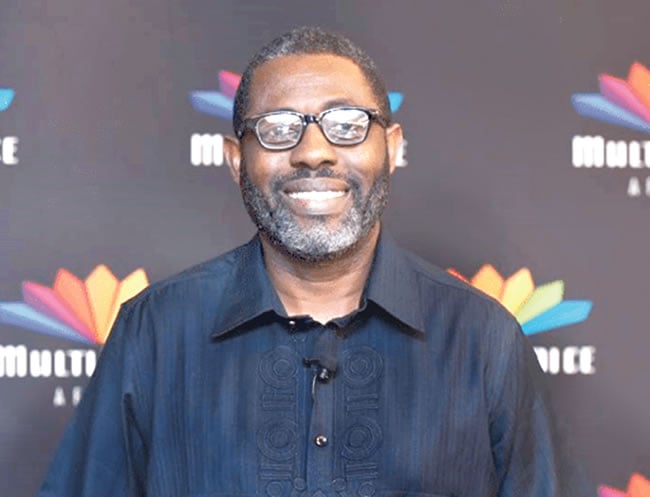THE Chief Executive Officer of Zuri24 Media, Femi Odugbemi, has lamented the poor education and lack of professionalism displayed by some African filmmakers.
In a keynote entitled ‘Leadership, Advocacy in Film in Africa and the Power of Authenticity’, he delivered virtually last weekend at the inaugural Creative Producers Indaba, Odugbemi acknowledged renewed interest in African films by Western distributors and festivals but noted that most filmmakers are ill-prepared.
He said, “outside of South Africa, and perhaps North Africa, our storytelling communities across the continent are passionate but unprepared. Many in the profession of filmmaking can’t be professional because they need education–not just of the technical kind, but of the consciousness kind.
“The opportunities and privileges of being allowed the uninterrupted attention of a global viewing audience for the length of the content we showcase are far too weighty for the ambitions of many of our producers and storytellers,” he said.
The Director, MultiChoice Talent Factory (MTF) West Africa Academy further noted that the youth are the majority in Africa and that their knowledge of their past is tenuous.
“The youth population often have no deep connection to the history of their tribes or the heroes of their cultures. The schools they have attended and the books and curriculum they have read have paid more attention to the learning of histories, cultures and heroes of Europe and America. They have not prioritized how to embrace any indigenous identity or cultural representation…many of those who are our storytellers are not as equipped as they need to be. Historically. Culturally. Ideologically.”
On authenticity, Odugbemi acknowledged that African stories are complex but could be told objectively. Authenticity, he said, is “first and foremost about bringing ‘balance’ to the narratives, to the imagery and the subliminal elements of our stories.”
It is, he added, “about acknowledging the complexities of our history, the conflicts of our contemporary experiences, the unarticulated disadvantages of our economic systems and our enduring capacities as a people.
“Accepting responsibility as an African storyteller to entertain the world with the drama of our stories yes, but to also embrace the opportunity and privilege to educate the world, within those stories, about our humanity, our compassion, our community, our spirituality; and our capacity to enrich the world beyond our gold, minerals and oil.”
The co-founder of the IREPRESENT International Documentary Film Festival further stressed that as Africans, we need to empower ourselves with our stories.
“African communities have a heritage of passing moral and cultural values through storytelling. The village square, the markets, and thee courtyards were spaces filled with folklore. These stories were always deliberately crafted to offer guidance and insight that shape the future of our communities and modified behaviour. “
He warned Africans not to indulge in the poverty porn that some Western audiences prefer. “We have to be far more deliberate and conscious about the insight we leave in the subconscious of our audiences about what is ‘Africa.’ Because what we imagine and story-sell becomes our reality in the fullness of time. Again, let’s make clear that this is not about white-washing our realities as it is; it is about being true to the ambitions of representation.”
Odugbemi further called for the development of better storytellers who understand that beyond the passion of storytelling, there is a purpose and who can easily collaborate with others.
“Filmmaking is challenging and requires talent and hard work. It also requires continuing education and re-education, especially of our young generation of storytellers.
He lamented that too many African storytellers compete, “and the sum effect of that seems to be a futile common struggle for validation from persons, spaces and institutions outside the continent. If we collaborated more, we could build value-chains and systems that will prosper and validate our stories, and our storytellers. The key is more systems-thinking and less individual fiefdoms and personal advantages.”
Finally, Odugbemi charged young and upcoming filmmakers to “embrace your mistakes. They are part of your growth plan. If you are humble enough to admit them, there’ll be enough helping hands to get you back on your feet.”
The Creative Producer Indaba was created to provide professional training and hone the leadership skills of tenacious producers interested in building the African film industry.
The year-long training programme features masterclasses and one-on-one meetings with assigned mentors to address topics including project development, financing, marketing and advocacy.
YOU SHOULD NOT MISS THESE HEADLINES FROM NIGERIAN TRIBUNE
What I Told Trump About Christian Massacre Allegation ― Buhari
President Muhammadu Buhari, on Tuesday, revealed his response to President Donald Trump over the American leader’s allegation that the Nigerian government was slaughtering Christians, telling him that the problem between cattle testers and farmers was a cultural thing rather than ethnicity or religion…
COMMENTARY: Four Reasons It’s Stupid To Compare Nigeria’s Petrol Prices With Other Countries, By Farooq Kperogi
In trying to justify Buhari’s latest callous hike in the price of petrol (amid a pandemic, no less), Buhari’s supporters increasingly sound like noisome idiots straining hard to be low-grade morons. Here are four reasons it’s stupid to compare Nigeria’s petrol prices with others…
Constitution Review: Middle Belt Congress Seeks Additional 19 States, Abolition Of Local Councils
Ahead of the proposed amendment of the 1999 Constitution by the Senate ad-hoc committee led by Senator Ovie Omo Agege, the Middle Belt Congress has submitted a memorandum to the Committee.
Investigation revealed that the MBC is seeking for the creation of an additional 19 states in the country to make the total number of states to 55…
50 Million Nigerians May Develop Mental Illness, Commit Suicide ― Expert
Contrary to what many people think, a mental health expert, Dr Jibril Abdulmalik has said that 50 million Nigerians stand a risk of developing mental health problems, and some culminating in suicide.
Dr Abdulmalik spoke at a one-day online training on mental health and suicide reportage for media practitioners in commemoration of the World Suicide Prevention Day (WSPD) 2020…






